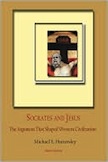 Socrates and Jesus: The Argument
Socrates and Jesus: The Argument
That Shaped Western Civilization
by Michael E. Hattersley
Algora Publishing. 200 pages, $33.95
THIS EXTENDED ESSAY explores the competing visions of Socrates and Jesus, demonstrating how their debate, continued by their philosophical ancestors over two millennia, helped shape Western culture into the uniquely argumentative, individualistic force it would become by the time of the Enlightenment.
At first glance, Socrates and and the historical Jesus appear to share much in common: “both believed they were acting under divine compulsion, lived extremely simple lives, taught for free, and accepted martyrdom as the final confirmation of their message.” However, Hattersley argues that Socrates and Jesus (and by extension the Greeks and the Jews) disagreed about such fundamental issues
They also held different beliefs about love. Socrates maintained that humans could approach divine perfection through the use of reason and love, which he called Eros. Jesus talked about a different kind of love, Agape, a divine love that humans were incapable of achieving on their own. Socrates and Jesus follows the interplay of Eros and Agape through the ages, from the Roman Empire to the present day, with chapters on the Middle Ages, the Renaissance, the Reformation, the Enlightenment, Romanticism, and the 20th century. The book examines how one or the other idea gained the upper hand in each succeeding era, as each was interpreted and argued by different philosophers and theologians.
Delving into the two figures’ biographies, Hattersley points out that we have much more reliable information about the life of Socrates than we do about the life of Jesus. Other contemporary texts besides Plato’s dialogues, such as Xenophon’s biography and Aristophanes’ comedy The Clouds, illuminate Socrates’ life and thought. In contrast, nearly all we know of Jesus’ life comes from the Gospels, which offer “dramatically different and often factually conflicting portraits of Jesus,” and which are steeped in allusions to the Old Testament and other ancient religions.
Toward the end of the book, Hattersley makes a striking observation. Although the present era is perhaps the most Socratic in history—reason and science having discovered many secrets of the universe and brought us an advanced technological society, with democracy in one form or another installed in most of the world’s countries—religion is still a force to be reckoned with. Despite the success of evolutionary biology, many people still doubt the validity of Darwinism and hold forth for a version of Creationism. Religious fundamentalism still inspires people to commit acts of extreme violence in the name of God. Intolerance against people of a different faith or different way of life seems to be at an all-time high. Why should this be the case?
Hattersley contends that religion, and Christianity in particular, offers a sense of community in this world and the promise of a better life in the hereafter. Philosophy, on the other hand, offers consolation and enlightenment only to those who have the time, discipline, and intellectual ability to study it. Religion will always have more adherents than philosophy. Thus, for example, Christianity became the primary religion of the Roman Empire because it appealed to everyone from rulers to slaves. At the same time, however, Christianity had to borrow much from Greek philosophy in order to convert the Roman elite. In each age, the partisans of Socrates and Jesus have had to respond to each other and adapt to a changing synthesis. This continuing dialogue—which has no equivalent in the world’s other great civilizations—is what has shaped the course of Western cultural history.
________________________________________________________
Charles Green, a writer based in Annapolis, MD, is a frequent contributor to this magazine.





